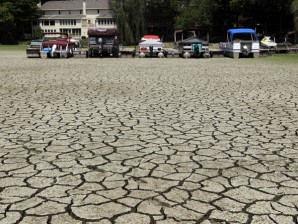COTABATO CITY, Philippines –- Farmers in Maguindanao have not been able to replant their rice fields because of a dry spell that started in February.
Maguindanao, one of the five provinces of the Autonomous Region in Muslim Mindanao (ARMM), have not experienced rainfall the past three weeks.
Mosa Saligan, a farmer in Datu Odin Sinsuat, Maguindanao, said the absence of rain has delayed re-planting.
The Liguasan marshland is so dry that its river bed has been exposed.
Most of the rice fields in Maguindanao are not irrigated and just depend on rainfall, according to Saligan.
“There are some areas which are irrigated but most in the upland are without irrigation. We rely on rain but we have not experienced that for some time,” another farmer, Kali Usman in nearby Upi, Maguindanao.
Lawyer Makmod Mending, regional secretary of the Department of Agriculture and Fishery (DAF-ARMM), said his office has sent teams to monitor the state of farm lands in Maguindanao so appropriate action could be taken.
“We expect this to happen, especially that summer is just around the corner,” Mending told reporters.
He said he has not received reports from the municipal and provincial agriculturists on the situation in their localities.
But he admitted ordinary people could easily figure out that the drying rice fields would most likely result in rice price increases.
“In anticipation of the dry spell’s effects on agriculture, we are sending teams to various towns and provinces to determine the extent of drought,” Mending said.
Meanwhile, the Department of Trade and Industry in the ARMM is closely monitoring the prices of rice in the market.
Mending said it would take two to three months before the buying public would feel the impact of the dry spell on rice prices.
RELATED STORIES
2010 drought not the worst in RP
